#subjectivity vs identity
Text
How To Be Gay, by David M. Halperin
While there are obvious fan studies classics, there are other books that don’t always fall into the “fan studies” canon that I have found incredibly useful for my own thinking. I cited one of them, Carol Dyhouse’s Heartthrobs: A History of Women and Desire (2017), a few posts ago; another is David Halperin’s How To Be Gay (2012)
How To Be Gay came out of a course Halperin taught at the University of Michigan, whose full title was “How to Be Gay: Male Homosexuality and Initiation.” The initiation in question was not sexual, but cultural: Halperin believes that there are not only gay texts, a gay canon of sorts, but also gay ways of reading that are taught and learned and that help constitute something we might call a gay subjectivity (that you don’t have to be gay actually to have): e.g. Hollywood movies, opera, Broadway musicals, camp, diva worship, drag, muscle culture, style, fashion, interior design. Halperin asked both why this set of things–why musicals? why this diva or that–and what do they tell us about gay experience? Halperin was trying to trace “gay men’s characteristic relation to mainstream culture,” which often involves collaborative and camp appropriation: a queering.
I find this book very useful, both because fandom also has its own shared languages and rites of initiation (consider the idea of watching something with fannish goggles or slash goggles or a fanfic lens, as was recently discussed in a previous post; think about all the languages and tropes and artistic structures we all learn from each other) but also because Halperin talks about modes of identification that aren’t representational or based obviously in identity politics. So, for example, he says that the gay male students in his class were more likely to express themselves vis a vis a shared text like The Golden Girls than vis a vis the traditions of what Halperin calls “good gay writing.” There is, Halperin argues, a queer pleasure in the Broadway musical that’s different than the pleasures of gay identity or even gay sex; similarly, queer female fans might find pleasures in identifying with, say, Sherlock, Crowley, or Blackbeard that are very different from the pleasures offered by a woman- or lesbian-centered text.
Here’s an excerpt that gives a good sense of the book, I think: fans might identify with this or recognize it as descriptive of their own fannish feels. (FWIW, the italics are all his!)
[H]omosexuality is not just a sexual orientation but a cultural orientation, a dedicated commitment to certain social or aesthetic values, an entire way of being.
That distinctively gay way of being, moreover, appears to be rooted in a particular queer way of feeling. And that queer way of feeling—that queer subjectivity—expresses itself through a peculiar, dissident way of relating to cultural objects (movies, songs, clothes, books, works of art) and cultural forms in general (art and architecture, opera and musical theater, pop and disco, style and fashion, emotion and language). As a cultural practice, male homosexuality involves a characteristic way of receiving, reinterpreting, and reusing mainstream culture, of decoding and recoding the heterosexual or heteronormative meanings already encoded in that culture, so that they come to function as vehicles of gay or queer meaning. It consists, as the critic John Clum says, in “a shared alternative reading of mainstream culture.”
As a result, certain figures who are already prominent in the mass media become gay icons: they get taken up by gay men with a peculiar intensity that differs from their wider reception in the straight world. (That practice is so marked, and so widely acknowledged, that the National Portrait Gallery in London could organize an entire exhibition around the theme of Gay Icons in 2009.) And certain cultural forms, such as Broadway musicals or Hollywood melodramas, are similarly invested with a particular power and significance, attracting a disproportionate number of gay male fans.
What this implies is that it is not enough for a man to be homosexual in order to be gay. Same-sex desire alone does not equal gayness. In order to be gay, a man has to learn to relate to the world around him in a distinctive way. (p. 12 - 13)
–Francesca Coppa, Fanhackers volunteer
65 notes
·
View notes
Text
i have a maybe lukewarm maybe hot take about this godforsaken show that some people could find mean, but i stand behind it, no elaboration (okay, some elaboration in the tags below… a lot of elaboration)
opinion: if you claim to like clara’s dynamic with the doctor and her character development in series 8 and 9, but simultaneously say you hate the impossible girl arc/elevenclara, you don’t actually understand anything about their relationship and what makes it the way that it is
#elaboration: it’s about the parallels. it’s about clara being the object of a mystery; the subject of a story VS writing her own story from#the name of the doctor onwards: refusing to become a puzzle box but taking it a step further and seeking to become the author of the#puzzles. it’s about her being chosen by missy all that time ago; because she was; among everything else; an avatar/projection of her#complicated feelings for the doctor in a way. a proxy that doesn’t know they’re a proxy#it’s about the mirroring of the impossible girl arc and heaven sent/hell bent! clara choosing of her own free will to splinter her identity#into millions upon millions of shards; dying over and over in every reality to save the doctor. compare to: the doctor choosing to spend#millions upon millions of years killing himself; dying over and over for the chance to save his clara.#the intertwined devotion! the complexity of their codependency! none of that would have developed the way it had if not for#clara being eleven’s impossible girl. she had to be a ghost story before she became a love story; and aren’t those two one in the same; as#stated in hide?#clara oswald#the impossible girl#twelveclara#whouffle#whouffaldi#doctor who#dw#peter capaldi#matt smith#jenna coleman#twelfth doctor#twelve#eleventh doctor#eleven#jamie catches up#jamie.txt#elevenclara
123 notes
·
View notes
Note
I'm sorry if this is a too deep question out of nowhere, but on your HCs, how do you think the curses (and mahito especially) perceive gender? Mahito uses masculine pronouns in canon, but do you think he identifies with a specific gender? Is agender? Is interested in studying the importance we humans give to it, or thinks it's too stupid and unecessary? Does he comprehend certain prejudices that humans have due to gender ideas? I was also going to include asking about sexuality too, but I think this is already a pretty big ask </3 have a good day S2

Feel free to ask anything you like! I love deep questions.
With curses in general I think the context matters - as in, the type of curse they are. Say a curse exists that was born from the suffering women have endured, I feel like that curse would be more attached to the associated gender because its existence and nature surrounds that gender specifically. Whether that curse has the sentience or care to identify as said gender is another thing to consider. How a curse presents itself could be directly related to that gender its nature is associated with, or it could be a more ambiguous thing that covets aspects of the specific gender despite being something more akin to agender.
I think it comes down to the nature of the curse (why the curse was born to begin with) + the level of sentience of the curse (if it possesses the awareness to care about gender). I think a curse lacking sentience/awareness that identifies as a gender is likely echoing its nature without consideration - like a ghost looping in the place it died. Curses seem to echo "gibberish" about what made them or is related to their birth.
By default I lean towards the 'no' zone of curses perceiving gender to the degree humans do. While gender can be important to the type of curse it is, gender doesn't actually serve a purpose beyond that to them. It's entirely a human construct in terms of identification. Gender serves a reproductive purpose, sure, but how many curses are out there making babies? I ask that because curses, as we know them, lean more into negative and destructive habits than positive and creation based ones.
The context of a curse is what can give them a gender association, but a curse possessing sentience to some degree is what can define their perception on gender - if they even have one.
With Mahito I think he understands humans value gender perception. I don't think he personally cares deeply on the matter himself in terms of identification, but he likes the way the male form feels more-so than the female form. From the angle I write him from, I feel like he's agender but likes to be masculine presenting in body to a degree.
(Side note: I have a running theory way off to the side on the fact he was more masc leaning because human hatred, fear and betrayal in history has been more knowingly caused by men and patriarchies. That's not me saying women haven't done shit things in history, mind you, since Mahito isn't really bound to any one gender doing one. But predominantly in history, regardless of country even, we see male leaders of nations or clans being the ones to decide the fates of others. Betraying their people, enslavement, forcing their people into war, murdering for their own gain or enjoyment, etc. and the greater documentation we have of it regarding men over women.
It made me think that maybe Mahito's development into a masc leaning build was influenced by that. But he also keeps his features feminine leaning because plenty of women in history have also done wrong. Both in the past and present day - whatever the span of energy was that built up enough to make him. Or remake him (again and again).
It's a very tentative thing I'm considering because obviously it Doesn't Sound Great on paper. But Mahito is a little bit of a scholar of sorts, between human psychology, philosophy and (in my opinion) having some manner of interest in history - I can see him kind of playing with this angle because it could feel right to him to embody aspects of what birthed him. Presenting as a feminine man also is its own topic that inspires stupid amounts of hatred in people. Seeing as Mahito likes to make people upset, uncomfortable, etc. I can also see him forming his body based on that.
And while I know a person's art style is liable to change here and there and what not - I find it fun to think that Mahito is just shapeshifting himself a little here and there. Thins his muscles, gets a little leaner now and then, sometimes gets more bulky. Adjusts depending on his wants or if he thinks it's necessary to.
Anyways, these thoughts in here are just tentative ones I'm musing on because I'm trying to factor in the things that birthed him and how they've played a role in humanity. So take this section in parenthesis with a grain of salt for now.)
Back to your inquiry, I think he'd be interested to learn how humans perceive it and what the fuss is all about. The subject of gender in the modern era sparks a lot of negativity between those who are going unheard and those who are obtuse on the matter. I think Mahito understands gender in the form of human reproduction and doesn't inherently think more on it beyond that.
If someone corrected him on how their identify he'd take a second to consider their physical form and if it was based on that or based on their mental perception of themselves. Either way, I don't really feel like he'd have a care in going along with how someone identifies as, since gender to him isn't a huge deal. On top of that, his interest in psychology and philosophy surrounding the subject is probably the saving grace here that would have him be interested in going along with it. Because without that, he really wouldn't care and would call someone whatever came to mind.
This isn't to say he's a nice curse, btw. Mahito will likely make rude jokes at the expense of someone. Gender, orientation, whatever regarding all that isn't really off limits if he wants to be mean in some way.
I think Mahito has a good understanding on the prejudices that exist. While he has no real attachment to gender as a curse and just decides based on his whim of what he likes at the time, he understands the value humans have with it and the negativity that generates because of the subject. Hell, he was probably born from a decent chunk of the hatred ignorant people have on the subject and the hatred (and fear) people on the other side of the debate (nonbinary, trans, etc) also experience.
Mahito sees this issues humans face and thinks they are silly things to squabble about. But hey, they are generating negativity and kind of proving his own ideology so he isn't about to complain either.
Also feel free to ask about sexuality! I'm pausing this answer without that part because I'm not wholly sure what about it you'd like me to address. If you mean how curses or Mahito perceive sexuality? Or if he associates with that-- like similar questions here just flipped for that subject or something else. So rather than presuming I'll let you feel free to ask if you'd like so I can give the inquiry the attention it deserves.
If I didn't answer something enough, feel free to specify and I'll clarify my thoughts further. I don't mind at all.
Mind anyone who gets this far, this is just my own opinion of how I write Mahito. It's fine if you disagree with any part of it. ^^
Thank you very much for asking! It was lovely to answer.
#also sorry if any part of this sounds short or ignorant when covering the topic. i was trying to keep concise to the inquiries and not delve#too deeply into the subjects outside of the character in question. i have my own very long history with gender identity stuff so any vague#descriptions isn't from an actual ignorant point but because i didn't want to delve into certain aspects or account for the nuances#of the subject when mahito's perception of it is more simple. this way the answer can be about him vs my opinion(s) on the topic xD#have i disclaimed this post enough?? lmfao#asks#headcanons
8 notes
·
View notes
Text
Absolutely death gripped clenched trying not to comment on reductive posts on ancient greek homosexual relationships
#It is neither wholly '0mg two gay guys in love!!' and 'I am humiliating and debasing a lower man by making a woman out of him'#There's heavy elements of that in how they conceptualized penetrator vs penetrated but the erastes (lover/protector) and eromenos (beloved)#relationship was significantly more complex than that#Like it is conceptualized as sort of a mentor/mentee relationship and a positive element for an adolescent's development#It was the subject of romantic plays and you get things like people in antiquity in heated debates over who is the#erastes and who is the eromenos between Achilles and Patroclus (to better depict them in plays)#The bottom line is more 'the socially accepted m/m relationships were (what we would now consider) an adult and a child#(or young man) with the age difference being a fundamental element to the dynamic.'#And more broadly being penetrated in sex assigned a 'lower' or 'womanly' role and it would not be conventionally accepted#for an older/more socially powerful man to recieve penetration (which certainly DID happen though)#So absolutely a moment in the history of male homosexuality and not something to just go 'ew ew bad evil ewwie' about but also#not something you want to project modern conceptions of LGBT identity upon#Also we know relatively little about relationships between women in ancient Greece due to lack of sources due to being a#highly patriarchal culture but we can't actually know that they did not involve similar power dynamic#Certainly not to the same extent or in such a well socially defined way (bc they conceptualize sex almost entirely through a lens of#penetration) but I think you should be treating relations between ancient Greek women with the same degree of#historical distance from our lives and identities today.#Ok death grip failed I just typed an entire rant. Fiuck it
51 notes
·
View notes
Text
u guys should know that the moment i finished translating that tiny little 100 word ficlet (which took me all day bc i don't KNOW the target language!!!) my brain went "cool :D now we've had some practice we can translate [13,000 word fic]". so. the hubris might be fatal jsyk
#the thing is the subject matter of [fic] is so SO suited to it...#it's that time travel AU i'm obsessed with and writing about the modern world from an ON pov would be sooooo fun#and i could do so many fun things with identity and complicated emotions#loanwords vs calques vs neologisms vs generic terms... poetic vs mundane registers... dialect of [third language. warning: hubris]...#rarghrhgrhghrgh
1 note
·
View note
Text
"What must have happened is: I try it on just for fun, look at myself in the shopkeeper's glass, and see that there, beneath the man's hat, the thin awkward shape, the inadequacy of childhood, has turned into something else. Has ceased to be a harsh, inescapable imposition of nature. Has become, on the contrary, a provoking choice of nature, a choice of the mind. Suddenly, it's deliberate. Suddenly I see myself as another, available to all, available to all eyes, in circulation for cities, journeys, desire.
- Marguerite Duras, The Lover
0 notes
Text
.
#jade watches gilmore girls#lorelai vs the identical karens!#it's not her fault they wouldn't drop the subject on her pregnancy#deb should've shut it down herself
1 note
·
View note
Text
I think there's something beautiful at existing late in the night and forgetting who you are, sinking into a single moment where you aren't defined by your physical attributes and are exactly who you've always thought you are.
#thoughts#thinking#night#late night#2am#object#subject#object vs subject#identity#idk#does that make sense?
1 note
·
View note
Text
Exploring Nondual Awakening and the Integral Perspective
A Journey of Unity and Integration
Introduction: In our quest to understand the nature of reality and human consciousness, two frameworks stand out: the nondual perspective and the integral perspective. While they differ in their approach, both offer profound insights and pathways to a deeper understanding of ourselves and the world around us. In this blog, we will dive into the differences,…
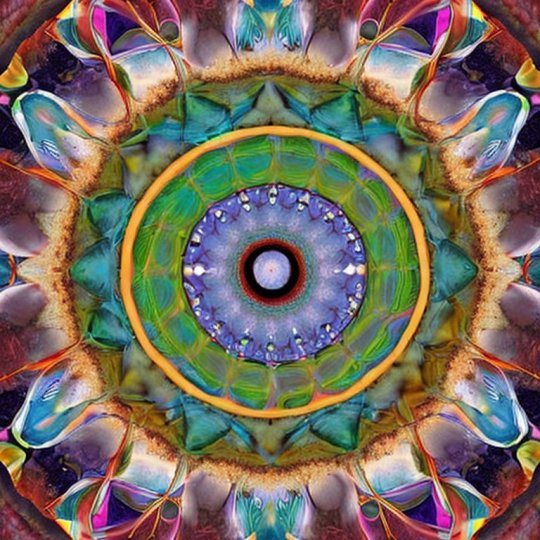
View On WordPress
#Awakening and personal growth#Dissolving ego identity#Embracing multiple perspectives#Exploring consciousness#Holistic view of reality#Integral perspective#Integrating subjective and objective aspects#Interconnectedness of existence#Nondual awakening#Nondual awareness and complexity#Nondual experience#Nondual vs. integral perspectives#Nonduality and holistic understanding#Transcending duality#Unity and integration
0 notes
Note
this is probably shaped by my limited frame of reference, but im really fascinated by witnessing the real-time development of adhd as a diagnosis. people attribute so many symptoms to it now or maybe they always did? i was wondering if you have any thoughts on what is the use of adhd specifically as a category within psychiatry. I'm esl so sorry for any confusing wording
no you're right imo; diagnostic categories are always somewhat in flux ofc but ADHD is one that has seen a particularly pronounced shift in the last couple decades. obviously this is multifactorial but my observation goes something along these lines:
'hyperactivity' has been dx'd in children since about the 1950s (also when Ritalin hit the market) but the ADHD dx doesn't really take off until the 90s (also when Adderall, a 2nd-gen reformulation of the 'obesity' drug Obetrol, hit the market). so, it's not all that surprising that 20 years later you see increased patient awareness of the diagnosis, increased popular interest in it, and shifting / expanding ideas of what it means and what ADHD 'is'. it's a relatively young dx.
part of the reason it's young is because it's basically a 'biopsychiatric' dx, meaning it diagnoses certain behaviours as being a 'brain problem' rather than having social causes or context. in practice this is complicated because psychs do use pharmacological approaches in conjunction with psychodynamic ones all the time; nevertheless, the central promise of DSM ADHD and its pharmaceutical treatments has consistently been that the ADHD subject has a physiological, neurological disorder / dysfunction / aberration, and that the drug treatments on the market fix it. that none of this is actually empirically supported is conceptually inconvenient and entrenched by the research process.
the biopsychiatric narrative is worth paying attention to because the context here is one in which it has become commonly accepted that behavioural 'disorders' and affective distress of various kinds can be, basically, either of pure biological origin, or else Your Fault. in the case of childhood hyperactivity, Your Fault historically also included Your Mother's Fault; part of the reason many mothers embraced Ritalin in the 50s and 60s was because the proffered pharmaceutical narrative explicitly challenged the idea that these mothers had done something 'wrong' to result in their (mostly) sons exhibiting disruptive and hyperactive behaviour.
this dichotomy of biology vs personal failing is very overtly present in quite a bit of discourse around ADHD today. if it's my brain being 'wrong' or different, then it's not something I've done wrong but a disease with a simple chemical fix. in this context I don't think it's surprising at all that a lot of popular and patient conceptions of ADHD have seen a considerable widening over the past few decades. often people like to blame this on pharmaceutical companies, and it's true that industry benefits from these discourses and frequently invests in them (eg, via instruments like ADDitude mag). however, that's a pretty simplistic explanation on its own and doesn't really account for the ways in which patients and potential patients also find this diagnostic category personally useful, for reasons ranging from identity-formation to the desire to access prescription amphetamines. ADHD increasingly shows up as a biologised explanation for behaviours ranging from 'eating too many sweets' to 'postural sway' and so on. you can see in such examples how invoking the idea of an aberrant ADHD brain is both reassuring to people who have been made to feel ashamed of certain behaviours, and provides a sense of shared identity and community with others.
all of this is to say: I don't find it surprising at all when I see a relative broadening of notions of ADHD, almost always expressed in biological terms (the 'ADHD brain' operates differently, 'seeks dopamine', causes this or that). ADHD is in some ways a particularly blatant distillation of this general trend in popular psychiatric discourses, for reasons relating to expectations about childhood and child behaviour, and the historical and present relationship between the ADHD label and the regulation of amphetamines. but much of what's happening with ADHD in terms of popular discourses about it can also be seen with many, many other psychiatric diagnoses, to varying extents and in various ways.
my experience writing about ADHD on this website leads me to close by explicitly stating the following: I do not think any ADHD behaviours / symptoms are people's 'fault' or an individual failing; I do not think using drugs for any reason is morally bad or needs to be justified; the fact that I do not think ADHD is a 'brain disease' does not mean I think people are 'making it up' or exaggerating wrt any difficulties they experience personally, professionally, emotionally, &c.
329 notes
·
View notes
Text
I think what really frustrates me about accusations of antisemitism when we say certain crimes are committed by the Israeli government towards Palestinians is that there is this base assumption that the individual identities of the people in the Israeli state are subject to individualization and identification but then we come across Hamas and all the resistance movements and people automatically categorize them as "good" or "bad" who either are "supported" or "not supported" by Palestinians. Aside from the fact that there are diverse political opinions within Palestine, people always seem to separate Hamas as a uniquely terrible group that only seeks to inflict violence irrespective of their current status of people under occupation not knowing how to change their circumstances and not afforded any contextualization.
When Palestinians talk about certain crimes against us perpetuated by the state of Israel we're told "that's libel" because our oppressors draw their identification as a nation-state as a "Jewish" state. In the same breath they condemn Hamas for killing Israelis and being uniquely antisemitic and not because they're actually fighting for any liberation. Forget the larger political context — the situation in which this exists is irrelevant in the short term analysis of how Hamas is "A Terror Organization".
Hamas is a result of circumstance. They wouldn't exist if the occupation didn't exist. You can't deny that hamas is the direct result of israel, and not because of the incendiary things that came out about who funded hamas or whatever — they are, at their core, a resistance movement against a colonial force.
And yeah, there are Palestinians that have said they don't like Hamas I guess but that... doesn't really matter to people who aren't Palestinian. The reasons they don't like Hamas are within their context of occupational circumstances. You can't just take quotes of Palestinians saying they don't like Hamas and frame it outside of their circumstance as a people living under an occupation. It would be dishonest not to mention that the greatest threat Palestinians face is the occupation. We (Palestinians) all acknowledge that. The differences in political opinion within Palestinian society aren't applicable to Israelis and non-Palestinians because you are not affected by Palestinian society in the same way that Palestinians are affected by Israeli and USAmerican society.
Israelis literally debate in open courts about whether or not to shoot unarmed Palestinians who hold rocks. There are no such discussions in Palestinian society. There are no systems really that can allow for Palestinians to feel like they actually have a political representative. Fatah, or the PA, is just a blatant puppet of the Israeli government. No one trusts them lol. So which avenues are we supposed to turn to when we are shot even as we peacefully protest? If our avenues rely on Israelis to decide that for us, then is that liberation? Is that freedom?
There is just a deep, deep dishonesty in people's treatment of defining what a state represents vs an individual and its almost always weaponized against Palestinians when we talk about the violence we experience and how we counter it.
505 notes
·
View notes
Text
there is an interesting symmetry between excluding ppl from the category of sane for unusual preferences or reported experiences on the one hand (responding to “i love people of my same gender,” or “i would be happier living as another gender” with “you are insane, and therefore not to be trusted”) vs excluding people from the category of insane for also reporting unusual experiences (responding to ”i feel too depressed to get out of bed,” or “i feel as though I have multiple identities” with “you are lying about your subjective experience and therefore just an attention-seeking sane person”). they share a skepticism of other people’s reported experience, presumably based on the fact their interlocutor hasn’t personally experienced those things, or can’t imagine what it’s like to experience them.
534 notes
·
View notes
Text
Aspects: Applying vs Separating

How to find them
Websites like astro.com show you whether the aspect is applying/lower with an (a) or separating/upper (s) next to the symbol of the aspect.

How to find them manually
When we have two planets or objects in consideration, one of them moves faster than the other.
Pick the slower planet. For example, between the Moon and Mercury, Mercury is the slower one.
See what's the opposite point to where Mercury is. If it is in 2° Libra, then the opposite would be 2° Aries. It's literally across the wheel.
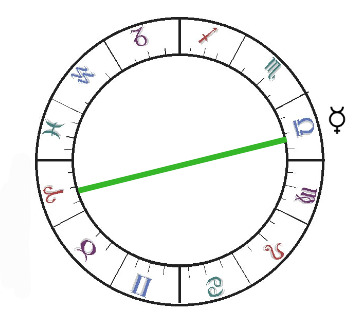
If the faster moving planet/object is moving towards the opposition point (applying), then the aspect is applying/lower:
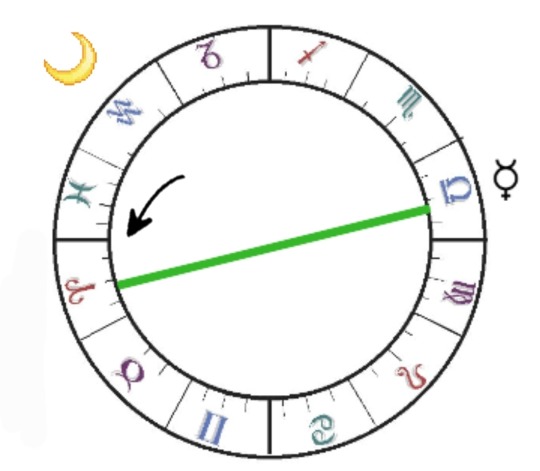
But, if the planet/object is moving away from that opposition point back to the slower moving planet/object, then it's a separating/upper aspect:



Meaning - Bil Tierney
You can read more about his definition of aspects and interpretations of each one in his book Dynamic of aspect analysis.
Applying aspects
These aspects are "associated with basic formative processes urging the individual to build a structure of personal self-image or ego-identity".
They help you to develop your subjectivity.
They aim to gain experiences to make sure you distinguish yourself as an individual.
They direct unconscious releases of energy toward the individual's needs, which means that they show how you act impulsively to meet your needs.
They represent the individual's tendency to impose themselves onto the enviroment.
With the inconjunct and square though, we start to become aware of tensions with other people's desires and needs.
Applying aspects are characterized by instinctial impulses, spontaneity and selfishness.
Separating aspects
These aspects are "associated with basic evaluative processes concerned with the balance of individual vs social needs".
Usually individual goals are reconisdered as one becomes increasingly aware of the social enviroment.
One starts to detach from desires and needs when they interfere with other people's rights.
Awareness turns to the greatest good.
We develop responsibility as we learn to share, interact and work along with others.
We develop a sense of community and aim for wholeness and unification.
Separating aspects are characterized by self-reflection, consideration for others and deliberation (as opposed to unconsciousness).

#astrology#astro placements#astro community#astro posts#astrology observations#birth chart#natal chart#astro chart#solar return
213 notes
·
View notes
Text
Okay just to show that like I promise I am doing stuff with the survey (cut to the 15 page paper sitting in my google docs rn but I’m not happy with it yet and I haven’t done everything I want to with the data yet), here’s like extremely preliminary stuff:
- 56% of people who took the survey were trans men, 26.2% non-binary, and 7.2% trans women. Of course there is overlap, Some legends chose all 3 options, some 2, and there are also a healthy amount of gender-fluid, bi-gender, and agender people.
-Only 2% were heterosexual, with 37% identifying as bisexual or queer, 24% homosexual, and 23% aspec or asexual.
- 58% were aged 18-22. Shoutout to the 2% of people aged 33-40. 29% were 23-27 and 11% were 28-32
- 85% of people had socially transitioned (I actually. Okay I took some liberties here because sometimes people would be like “I’ve gotten top surgery and HRT” but then wouldn’t check the social transition box but I feel like. They probably have) I did forget to put hysterectomy, that’s my bad.
- the majority (around 64%) of people who had gone ftmtf (or ftnbtf) had gotten top surgery (which is higher than the average 40% of AFAB people who had).
- I actually think it’s more interesting to look at the data from a non-binary (including everyone who didn’t choose trans man/transmasc or trans woman/trans fem. Non-binary here is more a category than a label) vs binary trans person perspective. Surprisingly binary trans people were more likely to fully detransition, but non-binary trans people were, ofc, more likely to say that this kink had helped them explore their gender identity
- Many people said that this kink helped them process trauma, rather it be from transphobia, child abuse, or sexual assault. This is in line with other studies looking at the connection between kink and trauma (not to say everyone who participates in kink has trauma, but more to say it’s an established outlet)
- AFAB people were more likely (90% of people who responded to that question) to say this kink had helped with their body image than AMAB people (only 30%) I actually haven’t gotten around to looking at non-binary vs binary for this part oops.
-41% of people have told sexual partners, with 32% not having told.
- The most common comorbid kink is breeding no matter if you’re into masculinization or feminization. AMAB people are more likely (42%) to be into hypno than AFAB people (15%)
Anyways that’s a brief summary FOR NOW. I have more in the works but. Also for the final paper these numbers are subject to change because I do still have data coming in and sometimes I go insane and change the way I’m counting things so. It shouldn’t be a massive change in terms of findings but more a change in terms of numbers (for example I’ve fucked around with categories, especially for kinks and gender and sexuality, a lot. I haven’t landed on how exactly I want to do all of this yet)
#detrans kink#forced detrans#detransition kink#ftm detrans kink#fakeboy#ftm misgendering#misgender kink#detrans me#misgenderingkink#detransitionkink#my survey
166 notes
·
View notes
Text
Going to be honest, the more I see of “Oaky the Owl” and “meandmyowl” (same person) the more I’m convinced Leslie does not have this bird legally.
So since she’s located in north Salt Lake City, Utah you can use this page to submit an anonymous tip.
What’s not legal about what she’s doing? Well for starters, on her website she has a merch page. Not only that, but she also accepts a lot of donations and such during live streams and allows fans to pay her to bring the owl and give presentations about surviving near death experiences or the healing power of crystals, not just conservation or falconry.
Which is a bit of a problem due to, well, let’s see, she claims the owl is held on a falconry permit, right? And it’s a great horned owl, meaning it’s a species protected by the migratory bird treaty act. So what does that mean? It means she’s meant to comply with regulations from Utah's falconry regulations, AND the migratory bird treaty act’s federal regulation.
Alright, so what do those documents say about that exactly? Let’s start off with the Utah falconry regulations first, linked here if you’d like to read the entire document.
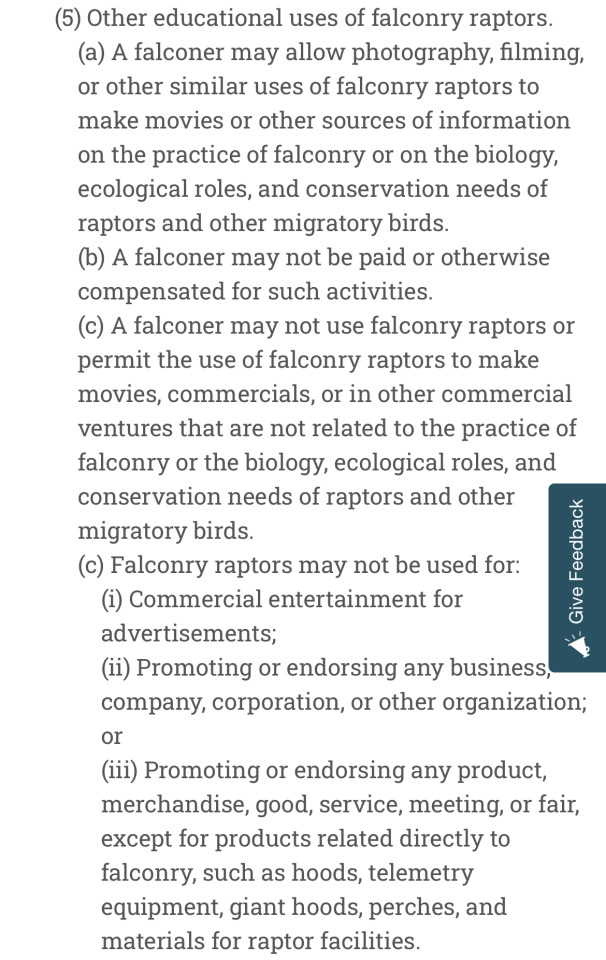
Article R657-20-28 subsection 5c clearly states that a raptor possessed under a falconry permit cannot be used in advertising or for commercial profit. The only profit a raptor held for falconry may garner would be if the bird is being used to promote conservation, biology, or falconry in some way. The gist of this is that you can use a falconry bird to, say, star in a documentary about falconry or the ecology of that species. You can have a gyrfalcon pose modeling a hood or jesses you are selling. You CANNOT use a falconry bird to sell phone cases or other merch for personal profit unrelated to the sport of falconry. Note as well that a falconer cannot be compensated for allowing their bird to star in a for-profit film, even when that film is about ecology or conservation.
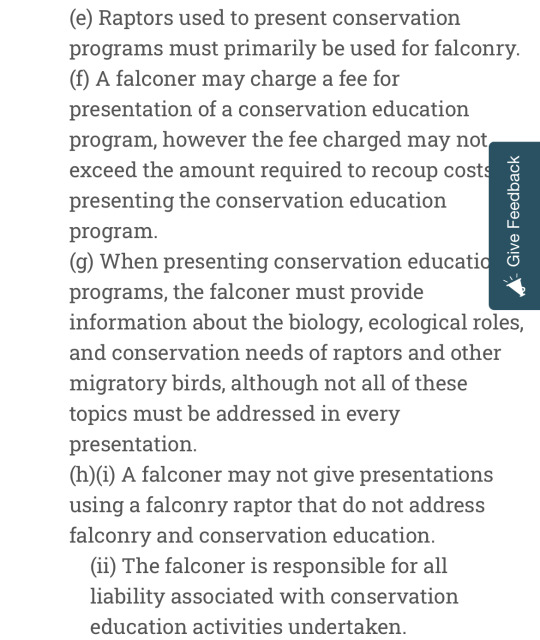

Subsection 4e-4h vs. what is advertised on her page. Using the owl for any of the first four subjects is in violation of R657-20-28. The pricing she charges for these talks is not stated on her webpage and is only revealed if you email her an inquiry, meaning it’s a bit hard to say whether she is charging more than what would pay for the program, but honestly you can guarantee she is since she clearly has no interest in ethics or honesty in using this owl. Worth noting as well is that she allegedly claimed on a livestream that she does not hunt with the owl because she’s “an animal lover” which would also violate subsection 4e as the bird is NOT primarily used in falconry, because by her own words she has stated that the owl is not used for falconry in any sense.
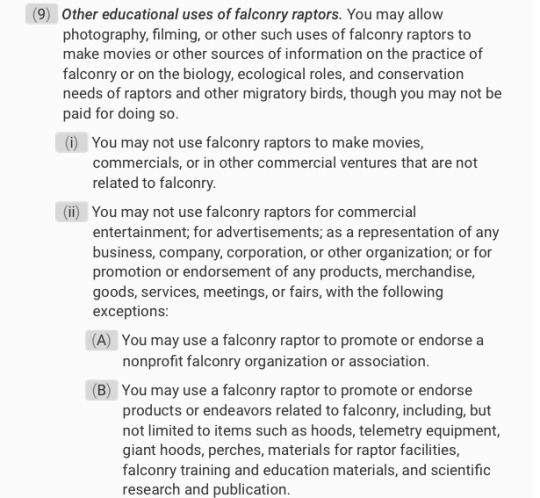
You can read the full section on falconry in the migratory bird treaty act’s federal regulations regarding the sport here, but it’s almost identical to the rules further regulated by Utah’s state government.
TL;DR: you cannot lawfully use a great horned owl possessed by falconry permit to sell personal merch, draw people to your spiritual talks, monetize livestreams, or profit in any way. And you should use the link above to report this as this person is just keeping an owl as a pet to exploit for financial gain and fame. This breaks state and federal law and there must be consequences to harmful behavior such as this.
Edit: apparently this is her name.

That’s not her home address, it’s a PO Box which she has public so people can send her gifts so I’m not censoring it. Please include her last name in all future reports.
#Falconry#me and my owl#oaky the owl#Leslie and Oaky#Signal boost#Owls#birds#aviculture#birding#ornithology#fish and wildlife#migratory bird treaty act
252 notes
·
View notes
Text
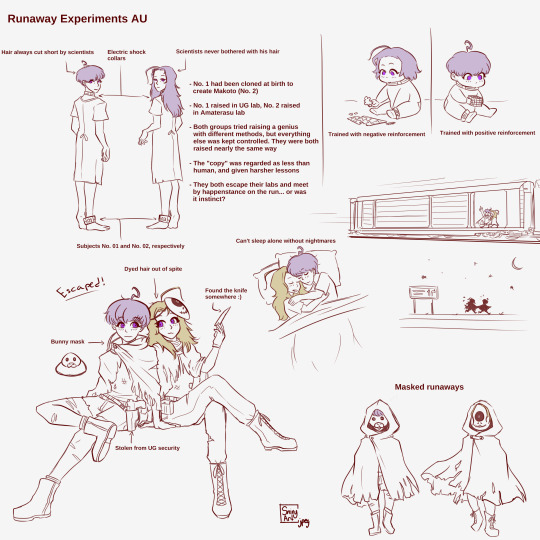
what if we were raised together but also raised apart, unaware of each other until the day we meet and then- only then- do our lives begin to make sense?
more lore under the cut! (it's a lot)
The labs raised them in somewhat the same way- and both methods dehumanizing. Yuma solves a puzzle for a juice reward. Makoto solves a puzzle to avoid getting shocked. Both get shocked at the slightest display of disobedience anyway. Both have strict routines and regimes where every aspect of their lives seems set in stone. What the scientists didn't take into account was that raising a little genius in such conditions will eventually backfire.
They both escape their labs on the same day, shortly after they turn 20. They also name themselves Yuma and Makoto around this time, only being referred to beforehand as "Subject No. 01" and "Subject No. 02." These escapes simultaneously piss off the researchers but also fascinate them- how much of their identical choices were made based on nature vs nurture?
For the first month traveling alone, Yuma spent his time trying and failing to do everything alone. He eventually receives the help of a stranger and starts helping random people, learning he'll receive kindness in return.
Makoto spent his lonesome travels scraping by and barely surviving without the assistance of anyone else. He's still bitter and angry about what the scientists have done to him. He regrets not burning the whole institution to the ground.
They both meet at a bar, where they, of course, instantly recognize each other's faces as their own. After a lot of guarded questions, they learn that they were both cursed with the same upbringing.
So Makoto asks Yuma to help him return to the Amaterasu lab and exact revenge.
Yuma doesn't wanna hurt anyone, but agrees to come along... with ulterior motives! He wants to show Makoto that this world isn't so bad, and dwelling on getting revenge isn't everything. Think like the core relationship in Mad Rat Dead, between Heart and Mad Rat.
And why is Yuma so stuck on this pacifist philosophy? Well, he'd already gotten his revenge. Turns out, putting a bullet into the head researcher who raised him only made him feel hollow and scared. He doesn't want Makoto to go through the same thing.
They meet the other cast members on the way, doing odd jobs and favors for them and forging small bonds with all the strangers they meet. They help Halara, a pet rescue volunteer, get a cat down from a tree and in return Halara teaches them a few survival skills. The meet Fubuki, who is lost in the supermarket, but it's also their first time in the supermarket so they all end up going on an "adventure" together until the clones escort her back to her limo. She tips them a fat wad of cash that keeps them fed and housed in hotels for like 3 months. They help Desuhiko, an up and coming music star who's anxious about getting on stage. The decide to do an opening act as a comedy duo- Makoto and Yuma are familiar with street performing for money after all- and it not only has the audience in a good mood but eases Desuhiko's anxieties. The clones see their first concert together and it's the most fun theyve ever had. Desuhiko, in return, patches up their clothes for them (though, they do end up messing the clothes up again later, lol) with his impressive sewing skills. They save Yakou from getting beat down by some debt collectors and Yakou lets them crash in his shitty little apartment for a while.
This is really just a really endearing and cute road trip story in my head. It starts off tragic but once they get out it's just two guys who only understand each other trying to explore a whole new world while making other lives better.
They eventually reach the Amaterasu lab again, but by that point, Makoto doesn't have it in him to exact revenge anymore. He hates the place, but it was still his home. It's complicated. He tells Yuma that all he wants to do now is keep traveling the world together.
That's when Yuma reveals he's been secretly planning with the other people they've helped together to expose the laboratory for the corrupt place it is and get it shut down. That way they can get their revenge the right way. Makoto is ecstatic.
After they expose the dirt on their respective labs and have those places shut down, they're free to travel together again and continue helping any random people they see who need it <3
if anyone has any questiosn abt this au ill gladly answer bc it's rotting my brain <3
#rain code#raincode#mdarc#master detective archives: rain code#yuma kokohead#makoto kagutsuchi#rain code spoilers#raincode spoilers#mdarc spoilers#makoyuma#kokotsuchi#<- can we start calling it kokotsuchi it's so much cuter sounding#i dont plan on making this a fic but i did wanna share the brainrot#runaways au
120 notes
·
View notes